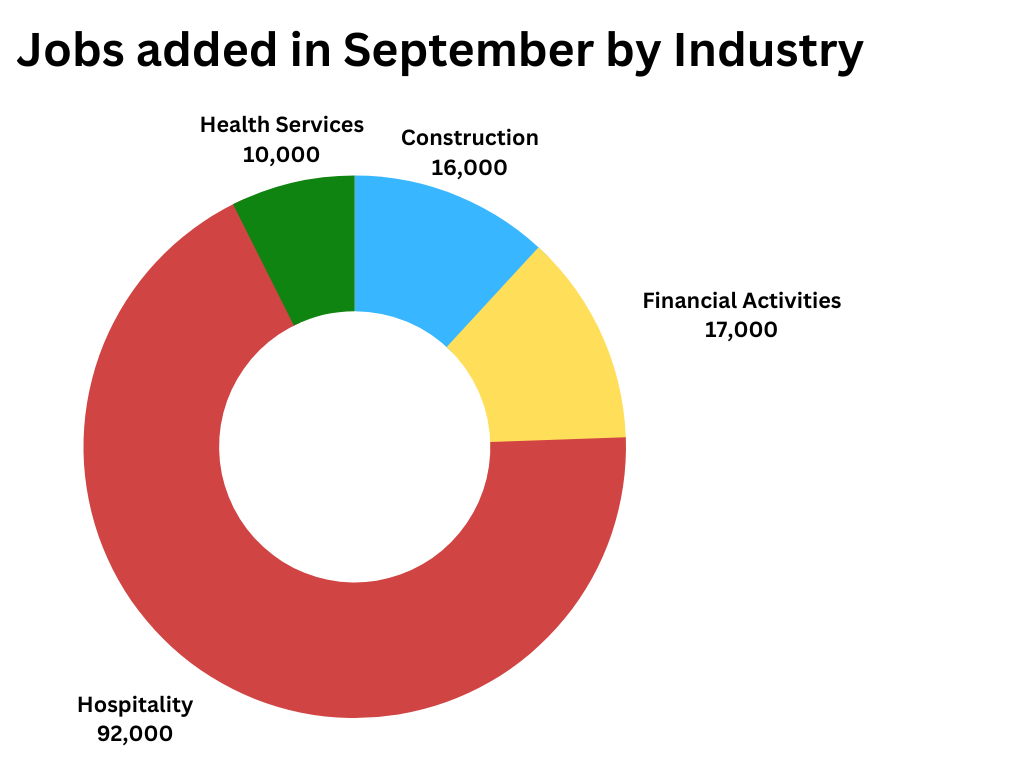
As we stand on the threshold of a new year, accounting and finance hiring leaders are facing a multitude of challenges and opportunities. Here are 3 crucial factors organizations should anticipate to ensure their departments are well-prepared for success in 2024.
1. Industry Outlook:
In 2024, certain industries are poised for growth¹. Understanding which industries are expected to see growth and increased hiring in 2024 can help you align your hiring strategy.
Construction: Infrastructure development and urbanization continue to drive demand in the construction sector. Finance professionals with expertise in project finance and cost management will be in high demand.
Jobs added in September: 16,000
Financial Activities: The financial sector remains a hotbed of innovation, with fintech companies leading the charge. Finance leaders with a deep understanding of digital banking, blockchain, and cybersecurity will be sought after.
Jobs added in September: 17,000
Hospitality: As travel and tourism rebound, the hospitality industry is gearing up for significant hiring. Finance and accounting professionals who can optimize revenue management and cost controls will be essential.
Jobs added in September: 92,000
Health Services: The healthcare industry continues to grow, driven by an aging population and technological advancements. Finance leaders who understand healthcare economics, compliance, and data analytics will be highly sought after.
Jobs added in September: 10,000
2. Compensation Strategies
Attracting and retaining top talent is essential for financial success in 2024. Consider these compensation strategies:
Market Analysis: Conducting a thorough market analysis is an ongoing process that can significantly impact your compensation strategy. Regularly reviewing industry benchmarks ensures that your compensation packages remain competitive. This entails not only examining the salaries offered by your competitors but also keeping an eye on the broader trends in your industry.
Have you read our 2024 Compensation Guide? Download your free copy here. Our compensation guide offers valuable insights and data, based on candidates we placed and compared to top salary resources.
Performance-Based Incentives: Another effective compensation strategy involves implementing performance-based incentives. Companies that utilize performance incentives report having 31% less turnover². This approach ties employees’ compensation directly to their contributions to the organization’s success.
By rewarding exceptional performance, you not only motivate your workforce but also create a clear link between individual efforts and company goals. Performance-based bonuses, for example, can be structured in a way that aligns with both short-term and long-term objectives.
Benefits and Perks: In today’s job market, candidates often look beyond the paycheck when evaluating job offers. Benefits such as flexible work arrangements, wellness programs, and professional development opportunities can be key differentiators.
Flexible work arrangements cater to the changing preferences of the modern workforce and can significantly enhance your company’s attractiveness to potential hires, and 31% of professionals consider flexible work arrangements very important when considering job4.
Additionally, 87% of professionals say that professional development and growth opportunities are essential in a job. Offering opportunities for professional growth and development, such as training programs or tuition reimbursement, demonstrates a commitment to employee career advancement, which can be a powerful retention tool.
3. Preparation for Success
Success in 2024 requires thorough preparation and a proactive mindset:
Talent Pipeline: Develop a talent pipeline by nurturing relationships with universities, professional organizations, and industry networks to ensure a steady stream of qualified candidates. Building this pipeline will be essential for your organization’s long-term success in 2024.
Beyond merely sourcing potential candidates, consider incorporating mentorship programs into your talent pipeline strategy. 55% of businesses contribute mentorship programs to have had a positive impact on profits5. Mentorship programs can provide valuable guidance and support to emerging talent, helping them develop the skills and knowledge necessary for success within your organization.
These programs not only benefit the mentees but also contribute to a positive employer brand, showcasing your commitment to employee growth and development. Read more on building a strong pipeline here.
Collaborative Approach: Foster collaboration between finance and other departments to ensure financial considerations are integrated into strategic decision-making. Along with the finance team, this collaboration may extend to departments like marketing, operations, and sales, among others.
By involving finance professionals in discussions related to strategic initiatives, you can leverage their financial expertise to make more informed decisions. Additionally, this collaborative approach promotes cross-functional understanding and alignment, which can lead to more cohesive and effective execution of strategic plans.
Conclusion
By focusing on industry trends, compensation, and preparation for success, you can position your department to thrive in the coming year. Embracing these strategies will not only enhance financial performance but also empower your team to navigate the challenges and opportunities that lie ahead.
Sources:
1. https://adpemploymentreport.com/
2. https://www2.deloitte.com/us/en/insights/deloitte-review/issue-16/employee-engagement-strategies.html/#endnote-36
3. https://www.linkedin.com/business/talent/blog/talent-engagement/companies-are-embracing-flexible-work
4. https://www.gallup.com/workplace/236438/millennials-jobs-development-opportunities.aspx
5. https://nationalmentoringday.org/statistics/


